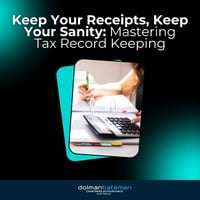ATO Audits, Tax Deduction, and How to Prepare for One as an Influencer
.png?width=1024&height=768&name=Blog%20Post%20Templates%20(22).png)
As a social media influencer, your tax obligations can be complex, and the Australian Taxation Office (ATO) is keen to ensure compliance.
An ATO audit can be daunting, but understanding what triggers an audit, learning more about tax deductions, the steps to take if you are selected, and how to maintain records can help you navigate the process smoothly.
Keep reading and we’ll provide you with the essential information you need to prepare for an ATO audit.
What Triggers an ATO Audit for Social Media Influencers?
The ATO uses sophisticated data-matching techniques to identify discrepancies in tax returns. Here are some common triggers that might prompt an audit:
- Unreported Income: If your reported income doesn’t match data from third parties such as banks, payment platforms, or business partners, the ATO may investigate further.
- High Deductions: Claiming unusually high deductions compared to your income level or industry norms can raise red flags.
- Lifestyle Discrepancies: If your lifestyle appears inconsistent with your declared income (e.g., expensive cars or frequent luxury travel without a corresponding income), this can trigger an audit.
- Frequent Losses: Continuously reporting losses, especially when your peers report profits, can prompt the ATO to check if you are claiming all deductions correctly.
- Industry Focus: Sometimes, the ATO focuses on specific industries, including the digital and influencer space, due to rising concerns about compliance.
Steps to Take if You Are Selected for an Audit
If you are notified that you have been selected for an audit, here’s what you should do:
- Stay Calm and Contact a Professional
First, don't panic. Contact a tax professional or accountant who can guide you through the process and help you respond appropriately.
- Understand the Scope of the Audit
The ATO will specify the period and aspects of your tax returns they are auditing. Understanding this scope is crucial for providing accurate information.
- Gather Documentation
Collect all relevant documents, including income records, expense receipts, bank statements, and correspondence that can support your claims.
- Respond Promptly
Provide the requested information within the given timeframe. Delays or incomplete information can complicate the process.
- Review Your Past Returns
Double-check your past returns for any errors or omissions. If you find mistakes, discuss them with your tax professional to decide the best course of action.
How to Maintain Records and Documentation to Support Your Tax Returns and Tax Deduction
Good record-keeping is essential for supporting your tax returns and making any audit process smoother. Here’s how you can maintain your records:
- Keep Detailed Income Records
Record all sources of income, including sponsorships, partnerships, advertising revenue, and sales of products or services. Use accounting software to track these systematically.
- Document All Expenses
Maintain receipts and invoices for all business-related expenses. Categorize them by type (e.g., travel, equipment, marketing) to simplify the process of claiming deductions.
- Use Digital Tools
Digital tools and accounting software like QuickBooks, Xero, or Wave can help you keep accurate records. These tools also make it easier to generate reports and summaries required during an audit.
- Track Mileage and Travel
If you travel for business, keep a logbook to record mileage and other travel expenses. This can support your claims for travel deductions.
- Retain Communications
Save emails and other communications with brands and clients. These can serve as proof of business activities and income.
- Regularly Review Your Finances
Periodically review your financial records to ensure they are up-to-date and accurate. This will help you spot any discrepancies early and correct them.
- Understand Retention Periods
The ATO requires you to keep records for at least five years. Ensure you have a secure system for storing and retrieving these documents as needed.
Facing an ATO audit can be stressful, but understanding what triggers an audit, knowing the steps to take if selected, and maintaining meticulous records can help you navigate the process with confidence. Good record-keeping and prompt, accurate responses are key to a smooth audit experience.
If you need personalized advice or assistance with your tax obligations, don’t hesitate to contact us at 02 9411 5422. Our team of experts is here to help you prepare for any tax situation and ensure compliance with ATO requirements.
Disclaimer:
The information provided in this article is general in nature and does not constitute personal financial, legal or tax advice. While every effort has been made to ensure the accuracy of this content at the time of publication, tax laws and regulations may change, and individual circumstances vary. Dolman Bateman accepts no responsibility or liability for any loss or damage incurred as a result of acting on or relying upon any of the information contained herein. You should seek professional advice tailored to your specific situation before making any financial or tax decisions.



